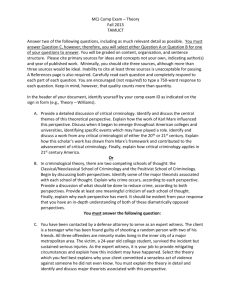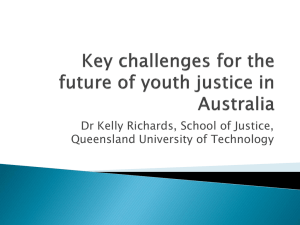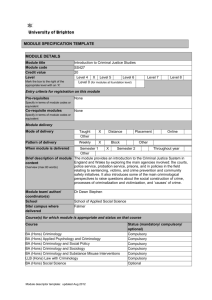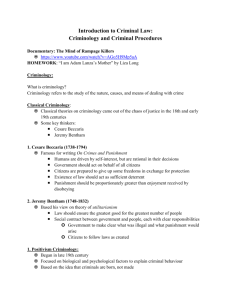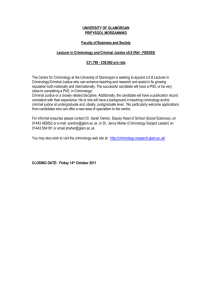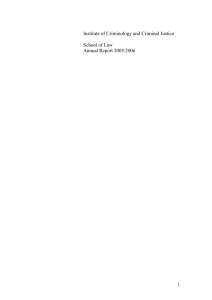fda_criminology_and_criminal_justice
advertisement
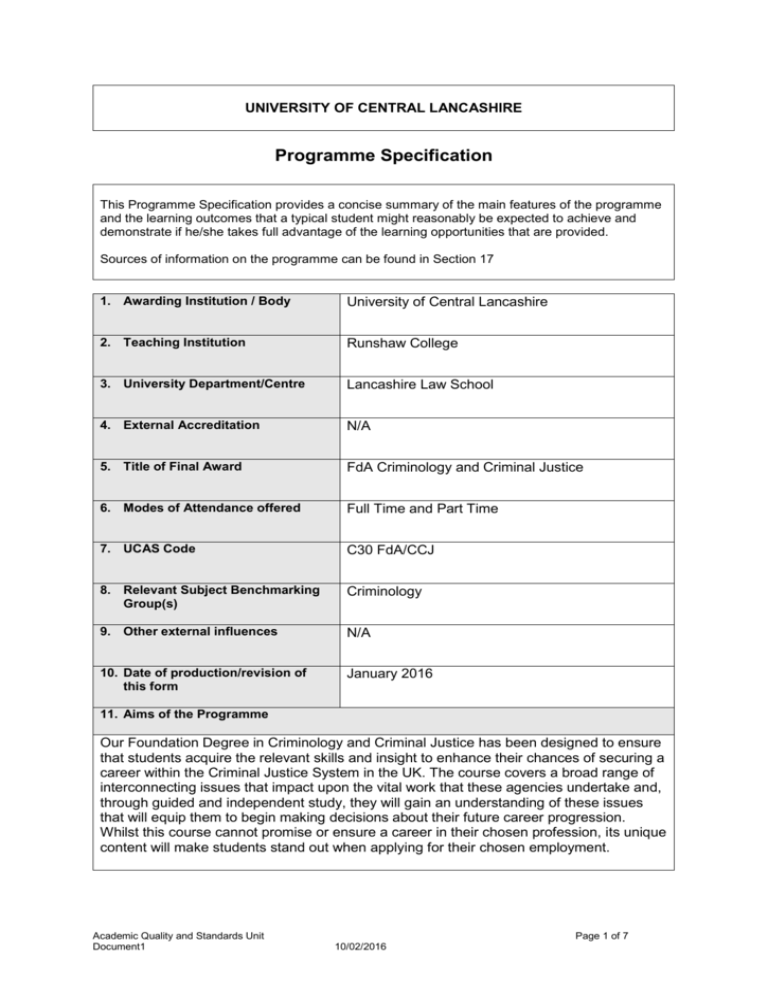
UNIVERSITY OF CENTRAL LANCASHIRE Programme Specification This Programme Specification provides a concise summary of the main features of the programme and the learning outcomes that a typical student might reasonably be expected to achieve and demonstrate if he/she takes full advantage of the learning opportunities that are provided. Sources of information on the programme can be found in Section 17 1. Awarding Institution / Body University of Central Lancashire 2. Teaching Institution Runshaw College 3. University Department/Centre Lancashire Law School 4. External Accreditation N/A 5. Title of Final Award FdA Criminology and Criminal Justice 6. Modes of Attendance offered Full Time and Part Time 7. UCAS Code C30 FdA/CCJ 8. Relevant Subject Benchmarking Group(s) Criminology 9. Other external influences N/A 10. Date of production/revision of this form January 2016 11. Aims of the Programme Our Foundation Degree in Criminology and Criminal Justice has been designed to ensure that students acquire the relevant skills and insight to enhance their chances of securing a career within the Criminal Justice System in the UK. The course covers a broad range of interconnecting issues that impact upon the vital work that these agencies undertake and, through guided and independent study, they will gain an understanding of these issues that will equip them to begin making decisions about their future career progression. Whilst this course cannot promise or ensure a career in their chosen profession, its unique content will make students stand out when applying for their chosen employment. Academic Quality and Standards Unit Document1 Page 1 of 7 10/02/2016 To create a supportive teaching and learning environment that will assist students’ academic development and seek to develop the wider potential of students from all educational backgrounds To provide students with an appropriate theoretical, conceptual, comparative and historical and methodological framework in which to locate their study of criminology and sociology To develop an awareness of cultural identity, diversity and inequality within criminal justice and society in general To develop student’s capacity to undertake independent critical inquiry into aspects of social or criminological concern To develop students’ written and communication skills To enable students to develop a range of transferable skills To provide students with an opportunity to study particular issues and themes in depth in criminology and sociology To provide students with an understanding of the contribution made by a range of disciplines and methodologies to the study of crime and society To develop a comprehensive knowledge of the subjects with a detailed understanding of main specialised areas (including knowledge gained by individual dissertation study) Academic Quality and Standards Unit Document1 Page 2 of 7 10/02/2016 12. Learning Outcomes, Teaching, Learning and Assessment Methods A. Knowledge and Understanding A1. A critical understanding of key theoretical, conceptual, comparative and historical approaches within social science A2. A critical understanding and appreciation of social processes in terms of cultural identity, diversity and inequality A3. A reflexive appreciation of the use and implications of methodologies applied to theories, practices and institutions of criminal justice and/or wider society A4. An ability to critically engage with and analyse the constitution and representation of crime and/or social identities Teaching and Learning Methods Lectures with all resources on Moodle Seminars/tutorials requiring students to read and prepare in advance Presentations by guest lecturers/professionals with specialist expertise/knowledge Enrichment and relevant trips Participating in group debate Assessment methods Formative and summative assessment End of module exam An extended investigation of a criminologically informed question Student presentations/group projects in some modules B. Subject-specific skills B1. Access, evaluate and utilise differing theoretical perspectives in the context of contemporary policies and debates B2. Recognise and evaluate competing insights within social science B3. Recognise contested methodological and ethical implications of research within social science B4. Recognise the wider context of crime and the criminal justice system and their implications for society Teaching and Learning Methods Focused lectures Seminar/Tutorial debate Presentations by guest lecturers/speakers Participation in debate Active learning tasks Enrichment and relevant trips Assessment methods Focused assignments: formative and summative End of module exam Extended written exploration of a criminologically informed question Assessed student led presentations Critical reviews Group projects C. Thinking Skills C1. Understand and challenge dominant ways of thinking about society and/or crime and how they are constituted and represented C2. Consider and articulate alternative explanations and demonstrate independent thought Academic Quality and Standards Unit Document1 Page 3 of 7 10/02/2016 C3. Recognise and assess competing theoretical and methodological positions from a variety of sources C4. Produce reasoned and evidence based arguments to justify conclusions and recommendations Teaching and Learning Methods Focused lectures Student participation in seminar/tutorial debate Student led presentations Assessment methods Focused assignments: formative and summative End of module exam An extended written exploration of a criminologically informed question Presentations D. Other skills relevant to employability and personal development D1. D2. D3. D4. Develop effective personal planning and time management skills Develop writing and IT skills Develop the ability to prepare and present arguments in appropriate written or oral language Develop the ability to give reasoned evaluations of the opinions of others Teaching and Learning Methods Focused lectures Seminars/tutorials Participation in debate Assessment methods Focused assignments: formative and summative End of module exams An extended written exploration of a criminologically informed question Academic Quality and Standards Unit Document1 Page 4 of 7 10/02/2016 13. Programme Structures* Level Level 5 Level 4 14. Awards and Credits* Module Code CJ2101 Module Title CJ2016 Understanding Policing 20 (comp) PL2007 Serial Murder 20 (comp) SS2001 Doing Social Research 20 (core) CJ2029 Controversial Issues in Prisons 20 (comp) PL2005 Criminal Law CJ1101 Crime and Society 20 (comp) 20 (core) CJ1005 Introduction to Criminal Process and Procedure 20 (comp) PL1007 Substance Misuse and Crime 20 (comp) CJ1102 Key Thinkers in Criminology 20 (core) CJ1004 Crime and Morality 20 (comp) PL1008 Criminal Extremism 20 (comp) Critical Thinkers in Criminology Credit rating 20 (core) Foundation Degree in Criminology and Criminal Justice Requires 240 credits including a minimum of 120 at level 5 Foundation Certificate in Criminology and Criminal Justice Requires 120 credits at level 4 15. Personal Development Planning The process of Personal Development Planning (PDP) will enable learners to monitor, build and reflect on their learning and personal development. They will be supported in recording their progress by module and Personal Tutors. This enables them to reflect upon their own learning and performance/achievement to plan for their personal, education and career development. It will enable learners to record and plan to achieve their aspirations and goals including : Their academic development Additional learning, for example what they learn from group work Learning and development from work placement, part time employment, sport, pastime or family responsibilities – this is defined by them individually The aim is to develop reflective, independent, self-motivated learners, with emphasis on selfevaluation and decision making. The objective is to make them more actively involved in what they want to get out of their studies. The Personal Tutor sessions will develop their skills in reviewing their own progress, action planning, researching, referencing, revising for exams and target setting. Academic Quality and Standards Unit Document1 Page 5 of 7 10/02/2016 PDP will be addressed throughout the programme with each module contributing implicit elements of personal development, which has been addressed in the construction of the module through content, structure and assessment to lead learners to the required end point. 16. Admissions criteria Programme Specifications include minimum entry requirements, including academic qualifications, together with appropriate experience and skills required for entry to study. These criteria may be expressed as a range rather than a specific grade. Amendments to entry requirements may have been made after these documents were published and you should consult the University’s website for the most up to date information. Students will be informed of their personal minimum entry criteria in their offer letter. The minimum entry requirements for FdA Criminology and Criminal Justice will be 200 UCAS points. All students should have GCSE English at grade C or above or the equivalent. Applications from individuals with non-standard qualifications, relevant work or life experience and who can demonstrate the ability to cope with and benefit from FdA level studies are welcome. If you have not studied recently you may be required to undertake an Access programme. For details of those offered by the University, please contact Course Enquiries, Tel (01772) 892400. For details of those offered by the College contact the College University Courses Admissions Team on 01772 642040 17. Key sources of information about the programme www.runshaw.ac.uk Academic Quality and Standards Unit Document1 Page 6 of 7 10/02/2016 Level 5 Level 4 Modules Module Titles Status Codes A 1 A 2 A 3 A 4 Crime and Society Core CJ1101 X X X X Introduction to Criminal Process and Procedure Substance Misuse and Crime Key Thinkers in Criminology Crime and Morality Compulsory CJ1005 X X X X Compulsory PL1007 X X X X Core CJ1102 X X X X X X Compulsory CJ1004 X X X X X Criminal Extremism Compulsory PL1008 X X X X Critical Thinkers in Criminology Understanding Policing Serial Murder Core CJ2101 X X X Compulsory CJ2016 X X Compulsory PL2007 X X Doing Social Research Core SS2001 X Controversial Issues in Prisons Criminal Law Compulsory CJ2029 X X Compulsory PL2005 X X Academic Quality and Standards Unit Document1 B 1 B 4 C 1 X X X X X X X X X X X X X X X X X X X X X X X X X X X X X B 2 C 3 C 4 D 1 D 2 D 3 D 4 X X X X X X X X X X X X X X X X X X X X X X X X X X X X X X X X X X X X X X X X X X X X X X X X X X X X X X X X X X X X X X X X X X X X X X X X X X X X X X X X X X X X X X X X X X X B 3 X X X X X X X X X Page 7 of 7 10/02/2016 X C 2 X X X
